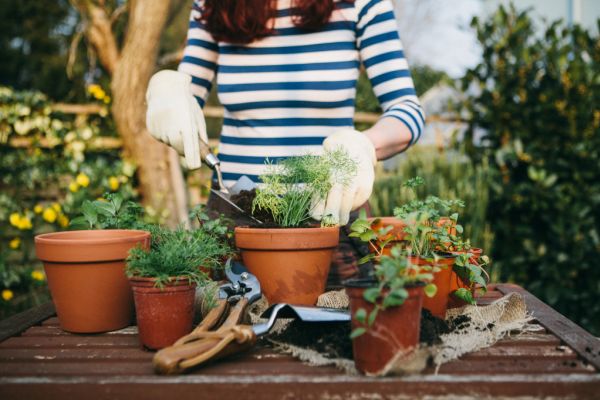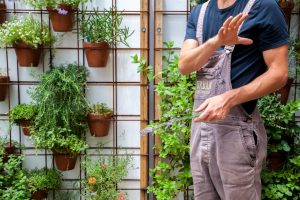
A cosy urban garden is a challenge, but a rewarding one to get right!

Access, pets, play areas, solar limitations and the extra work-from-home usage for our garden spaces are all fair but sometimes contradicting considerations. If you’re thinking about training vines, greening walls or making shade with edible or ornamental plants here are a few quick factors to consider.
Pick a sunny northerly aspect if you can, but east or west will do. Just try to select the sunniest part of the garden for growing seasonal produce. You’ll get more hours of sun facing north and it’s much needed in winter. A quick and easy hack to maximise UV is to prop pots up to lift them out of the shadows.
Climbing annuals have tendrils so they’ll need about a pencil-width trellis/wire to stay secure. To plant this spring try beans, pumpkins (Gold Nugget or Jack Be Little for small spaces), watermelon (Sugar Baby is a more compact variety) or rockmelon in warmer climates. Cucumbers are an easy summer crop so why not experiment with a few varieties such as Crystal Apple?
At my house, we’ll be growing the vine type of tomato (the one that needs staking) rather than the bush type (stand-alone) as we have the space and the harvest is more prolonged.
Raspberries, blackberries, loganberries and currants grow on flexible canes so can be tied and fanned out on sunny walls.
Avoid hosing the leaves of these plants, especially at dusk, as this can create a damp environment for powdery mildew (the white coating on leaves). Use an eco fungicide if this occurs or a home remedy of one part milk to 10 parts water in a spray.
For large perennial (long-term) vines try passionfruit, kiwi (cooler climates) or grapes.
Larger pots or planters are better for climbers as they’ll grow more vigorously and have plenty of soil water to draw on while they are hugging hot walls and being blown about. I think larger climbers such as grapes and other ornamentals like wisteria and bougainvillea do better in the ground, assuming you want them to fill out over a pergola or create dense shade. A good rule of thumb here is: big vine, big pot; small vine, small pot.
Covering your walls with deciduous plants is not only visually appealing but brings endless thermal benefits to your home throughout the seasons.
Not only that, the benefits of space saving means you can up the ante. Vines, hanging pots and espaliered fruit trees are excellent ways to get more out of less. Try mint, watercress or thyme in hanging pots.
Many types of fruit trees can be bought or trained to grow flat against a wall (espaliered). The most common are citrus, apple, pear and fig. These generally cost more but still provide plenty of produce and are great when you don’t want a fruit tree to take up most of your space.
Source: Domain & Urban Growers




